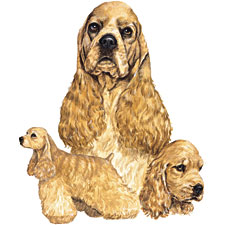| Facts
about the American Cocker Spaniel
Origin
The popular
Cocker Spaniel, sometimes called the American Cocker Spaniel, was originally
developed from careful breeding of the English Cocker Spaniels brought
to the United States. The American Cocker Spaniel is smaller than the English
Cocker Spaniel and has a different conformation. The name "Cocker" comes
from the woodcock, a game bird these spaniels flushed particularly well.
Today, the Cocker Spaniel serves primarily as a companion and glamorous
show dog. It can also be used for hunting, tracking, retrieving, watchdogging
and agility.
Group
Gun Dog, AKC Sporting
This is a beautiful spaniel with
very long hanging ears, a rounded head, and a profuse, silky, feathered,
medium-length coat. The head is chiseled with an abrupt stop. The muzzle
is wide, deep and broad with a square jaw. The upper lip hangs down, covering
the lower jaw completely. The teeth are strong and should meet in a scissors
bite.
The nose is always black on black
dogs, but may be brown on other dogs. The eyes are round, set on so they
look straightforward. The eye rims are slightly oval. The body is compact,
with a short back.
The topline should slope
gently downwards from front to back. The front legs are straight, with
good bone. Dewclaws on front and rear legs should be removed. The coat
comes in buff, black, and other solid colors, black-and-tan (like a Rottweiler
or Doberman Pinscher), parti-color (white with black, white with buff or
red, white with black and tan points) Some requirements for correct markings
are specified in the standard. The tail is docked to 2/5 it's original
length and is carried on a line with its back; it is constantly in motion.
Field lines generally have shorter coats which are better suited to work
in brush. They also have better hunting instincts. Both types make good
pets.
Temperament
Bold and keen to work, the American Cocker Spaniel is equally suited to
life as a gundog or as a household pet. Cheerful, sweet, and sensitive,
the Cocker Spaniel is an inseparable friend of children, and respectful
of its master's authority without much challenge. Merry and endearing.
A happy tail-wagger. Gentle and trusting, with average intelligence. They
are lively, playful and devoted, but should be socialized well when they
are young to avoid a tendency for timidity.
Cockers love everyone and need people to be happy. They can be difficult
to housebreak and some like to bark. However they are mostly easy
to train and get along well with other animals.
This is a very popular breed. Beware of poorly bred puppy-mill Cockers
as they may have bizarre temperamental changes and behavioral
problems. This would include shy-sharpness, which is a combination of fear
and dominance that can cause viciousness. Also Submissive urinating; aggressive
guarding of objects, people and places, hyper-sexuality and roaming.
Height, Weight
Height: Dogs
15 inches (38cm.)
Bitches 14inches (36.8cm.)
Weight:
24-28 pounds (10.9-12.7kg.)
Dogs larger than these limits
are disqualified from shows.
Health Problems
Some major concerns are cataracts,
glaucoma and patellar luxation. Some minor concerns are hip dysplasia,
ectropion, entropion, PRA, allergies, seborrhea, lip fold pyoderma, otitis
externa, liver disease, urolithiasis, prolapse of nictitans gland,
CHF, phosphofructokinase deficiency, and cardiomyopathy. Occasionally
seen are gastric torsion and elbow dysplasia.
Living Conditions
Cockers will do okay in an apartment
if they are adequately
exercised, and are fairly active indoors. A small yard is sufficient.
Exercise
American Cockers have plenty of stamina
and need regular exercise. When walking, avoid brushy thickets that can
tangle the coat.
Life Expectancy
About 12-15 years.
Grooming
The eyes need regular cleaning. Some owners
prefer to leave the coat long, brushing daily and shampooing frequently
with quarterly scissoring and clipping. Others prefer to clip the coat
to medium length to be more functional. Either way, the dog will
need regular trimming. When brushing, be careful not to pull out the silky
hair. This breed is an average shedder.
Recognition
FCI, AKC, UKC, KCGB, CKC,
ANKC, NKC, NZKC, CKC, CCR
|

